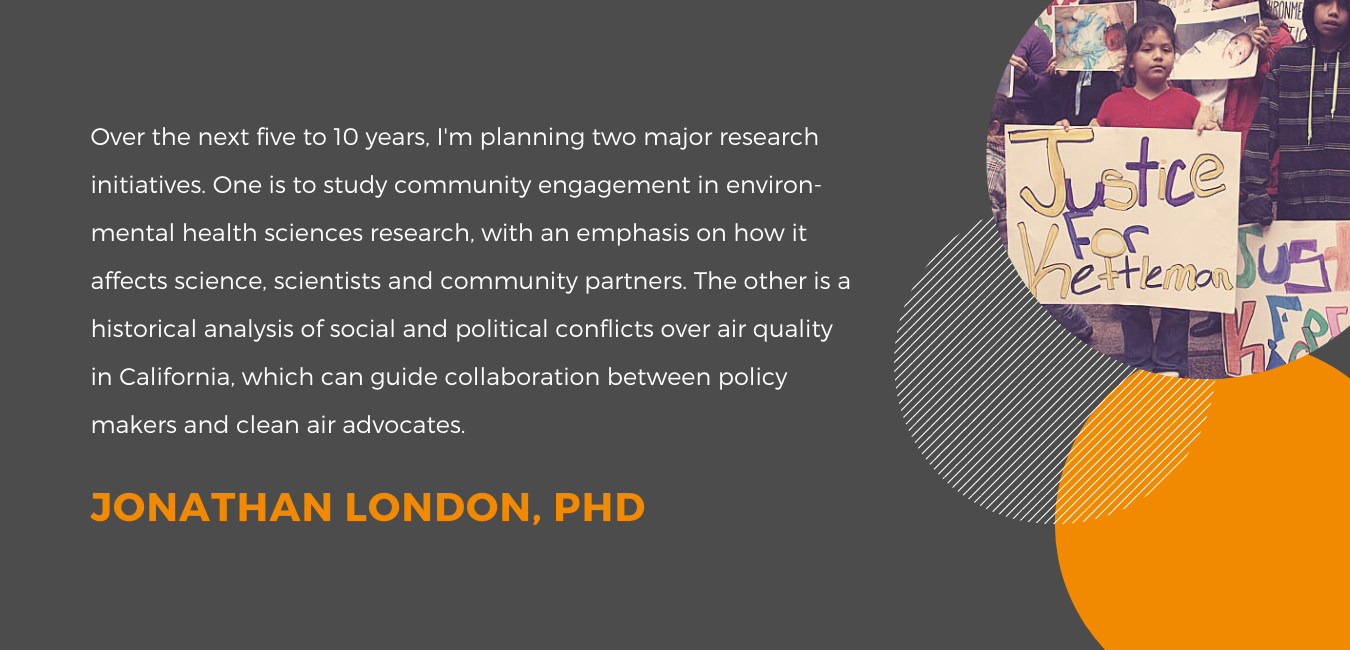

Jonathan K. London, PhD is an expert in participatory research, rural community development and community-engaged planning. He connects researchers to California’s rural communities by focusing on environmental justice issues.
Dr. London tackles a range of problems from collaboration around forest management in the Sierra Nevada to pollution of drinking water in the state’s agricultural heartland.
He uses engaged scholarship to help both the university and its community partners learn and benefit from working together. Dr. London’s research explores: How social movements use their grassroots, legal and scientific resources to mobilize for environmental justice; the complexities of conflict and collaboration between leaders in advocacy, policy and research; and how environmental hazards are related to race and socio-economic factors in certain populations and places.
Dr. London has conducted groundbreaking research on access to safe drinking water and the health risks of disadvantaged communities in California’s San Joaquin Valley. His research showed that access to safe water wasn’t equal but could be, which influenced the state’s water policies and funding initiatives.
Dr. London also developed the innovative Cumulative Environmental Vulnerability Assessment (CEVA), a socio-spatial methodology that analyzes and maps environmental hazards and social vulnerabilities to help communities develop in sustainable and healthy ways. CEVA was such a success that the State of California created one like it.
As director of the UC Davis Center for Regional Change and co-director of the Community Engagement Core of the UC Davis Environmental Health Sciences Center, Dr. London is a well-known catalyst for policies and research that can build healthy, prosperous, equitable and sustainable regions in California and beyond.
Contact
Email: jklondon@ucdavis.edu
Phone: 530-219-9082
Social media: Twitter
Positions at UC Davis
Associate Professor, Department of Human Ecology
Director, Center for Regional Change
Co-director, Community Engagement Core, Environmental Health Sciences Center
Areas of expertise
- Community-engaged research
- Environmental justice policy
- Health disparities
- Rural community development
- Regional equity
- Social movements
- Socio-spatial methodology
Dr. London is on the advisory board of Tracking California, a California Department of Public Health and Public Health Institute partnership that makes environmental health data and information available to the public.
He’s also on the Socio-Economic Advisory Group for the California Natural Resources Agency’s Rehabilitation of Clear Lake program.
Major research papers
Karner A et al. 2014. Rural communities and transportation equity in California’s San Joaquin Valley. Transportation Research Record: Journal of the Transportation Research Board 2452: 90–97. https://www.researchgate.net/publication/273526573
London J et al. 2013. Revealing the invisible Coachella Valley: Putting cumulative environmental vulnerabilities on the map. California Institute for Rural Studies. https://humanecology.ucdavis.edu/sites/g/files/dgvnsk161/files/inline-files/limited_dist_14_revealing_invisible_coachella_valley.pdf
London J et al. 2013. Growing community-university research partnerships in the San Joaquin Valley. Environmental Justice 6.2: 62-70. https://www.liebertpub.com/doi/10.1089/env.2012.0036
London J et al. 2013. Racing climate change: Collaboration and conflict in California's global climate change policy arena. Global Environmental Change 23.4: 791-799. https://www.sciencedirect.com/science/article/pii/S0959378013000484
Huang G et al. 2012. Mapping cumulative environmental effects, social vulnerability and health in the San Joaquin Valley, California. American Journal of Public Health 102.5: 830-832. https://www.ncbi.nlm.nih.gov/pubmed/22420800
Huang G et al. 2012. Cumulative environmental vulnerability and environmental justice in California’s San Joaquin Valley. International Journal of Environmental Research and Public Health 9.5: 1593-1608. https://www.ncbi.nlm.nih.gov/pmc/articles/PMC3386574/
Liévanos R et al. 2011. Uneven transformations and environmental justice: Regulatory science, street science and pesticide regulation in California. Technoscience and Environmental Justice: Expert Cultures in a Grassroots Movement: 201-228. https://mitpress.universitypressscholarship.com/view/10.7551/mitpress/9780262015790.001.0001/upso-9780262015790-chapter-8
London J et al. 2011. Collaboration, participation and technology: The San Joaquin Valley Cumulative Health Impacts Project. Gateways: International Journal of Community Research and Engagement 4: 12-30. https://epress.lib.uts.edu.au/journals/index.php/ijcre/article/view/1780
London J et al. 2011. Healthy youth/healthy regions: Informing action for the nine county capital region and its youth. Sierra Health Foundation. https://www.researchgate.net/publication/261316375_HEALTHY_YOUTH_HEALTHY_REGIONS_INFORMING_ACTION_FOR_THE_9-COUNTY_CAPITAL_REGION_AND_ITS_YOUTH
London J et al. 2011. Land of risk/land of opportunity: Cumulative environmental vulnerability in California's San Joaquin Valley. https://regionalchange.ucdavis.edu/news/ceva-san-joaquin-valley
Shilling F et al. 2009. Marginalization by collaboration: Environmental justice as a third party in and beyond CALFED. Environmental Science & Policy 12.6: 694-709. https://www.sciencedirect.com/science/article/pii/S1462901109000471
Sze J et al. 2009. Defining and contesting environmental justice: Socio‐natures and the politics of scale in the Delta. Antipode 41.4: 807-843. https://onlinelibrary.wiley.com/doi/full/10.1111/j.1467-8330.2009.00698.x
Sze J et al. 2009. Best in show? Climate and environmental justice policy in California. Environmental Justice 2.4: 179-184. https://www.liebertpub.com/doi/10.1089/env.2009.0028
London J et al. 2008. Problems, promise, progress, and perils: Critical reflections on environmental justice policy implementation in California. UCLA Journal of Environmental Law & Policy 26: 255 https://heinonline.org/HOL/Page?handle=hein.journals/uclalp26&div=14&g_sent=1&casa_token=&collection=journals&t=1561673711
Sze J et al. 2008. Environmental justice at the crossroads. Sociology Compass 2.4: 1331-1354. https://onlinelibrary.wiley.com/doi/full/10.1111/j.1751-9020.2008.00131.x
Richardson JA et al. 2007. Strategies and lessons for reducing persistent rural poverty: A social justice approach to funding rural community transformation. Community Development 38.1: 92-107. https://community-wealth.org/sites/clone.community-wealth.org/files/downloads/article-richardson-london.pdf
London J. 2007. Power and pitfalls of youth participation in community-based action research. Children Youth and Environments 17.2: 406-432. https://www.jstor.org/stable/10.7721/chilyoutenvi.17.2.0406#metadata_info_tab_contents
London, J et al. 2005. Power plants and forest plans: Two decades of mobilization in a mountain forest community. Communities and Forests: Where People Meet the Land : 78-96.
London J et al. 2002. American Indian management of federal lands: the Maidu cultural and development group. Nontimber forest products in the United States: 327-344.
Honors
- Society of Environmental Toxicology and Chemistry, Distinguished Service Award (2016)
- Random Act of Kindness Award for Community Resilience and Justice (2015)
- Rural Sociological Society Natural Resources Research Group Merit Award (2011)
- Ford Foundation Doctoral Fellowship for Community Forestry and Natural Resource Partnerships (1999)
- National Science Foundation, Doctoral Dissertation Improvement Award (1999)
Video archive
See Jonathan London talk about community-engaged research in this video about the 2018 Environmental Justice Tour.
Environmental Justice Praxis: A Navigation Guide for a New Generation of Engaged Scholars, Boston University, April 5, 2017.
Civic Spark Webinar on Environmental Justice in California, February 15, 2017.
Great Valley Center interview. Jonathon London on the role universities play in having a better future for people in the Central Valley, May 4, 2009.
Education
- PhD, Rural Social Science, University of California, Berkeley, 2001
- MCP, City and Regional Planning, University of California, Berkeley, 1995
- BA, Environmental Studies, Brown University, 1991
